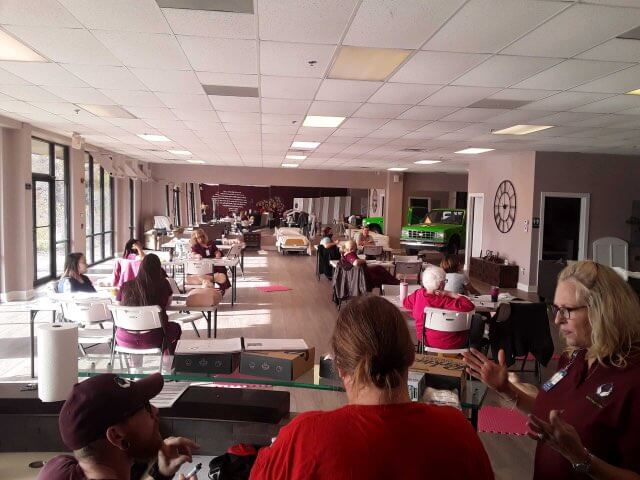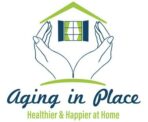VA Provider
In order to be a Veterans Affairs (VA) provider the Veterans Health Administration (VHA) requires all individual VA health care providers that provide billable VA health care services to obtain a National Provider Identifier (NPI) number. Not all Home Health Care companies have an NPI, however Aging In Place LLC is an VA Provider that has a designated NPI number to care for veterans.
Living at home as long as possible is a major goal for many older adults, and it becomes even more popular when we get older. The number one reason why people want to live in their own homes past retirement age (50-64) according to AARP is because they enjoy having less responsibility. However, this falls down drastically once you hit 65 years old where only 87% choose living with family members or others outside of owning property themselves!
In-home care services can make life a long term reality for seniors. Homecare allows them to stay in their own homes and be cared for by professionals who come into the house as needed, freeing up loved ones who live too far away from visiting often or cooking healthy meals. In fact, many people use these types of services because they offer peace-of mind knowing that if something were ever going wrong with an aging parent then professional help would always be available without having to worry about how much time it takes out on trips back home just so someone could cook dinner every night.
Quick Facts on In-Home Care
- The cost of in-home care varies from state to state. The median average yearly cost across the US is $45,760 according to figures from Genworth’s 2016 Cost Of Care Survey and Alaska has the highest at $59,488 per year while Louisiana has one of lowest prices with just $34,892 dollars annually for full time homemaker services.
- The VA Aid & Attendance Pension benefit is a way for veterans and surviving spouses to get assistance with activities of daily living. This includes in-home care costs!

What is Included with In-Home Care?
In general, there are two kinds of in-home care: homemaking and home health assistance. Homemaker services provide just a bit lower priced than their counterparts for personal assistants who focus on bathing clients as well as other important daily tasks such preparing meals, keeping houses clean, running errands with mailings, correspondence dealing, bills, scrapbooking, socializing etc. The type you choose depends largely upon your needs but it’s always best to talk through these things before signing anything so that both parties know exactly what they’re getting themselves into!
Home health aides are essential for the care of people who can’t live on their own, as they provide a variety of services to help them stay healthy and comfortable. Homecare workers have been specially trained in order to monitor patients’ needs from meals or hydration levels all while being there if you need anything! In addition home assistants will assist with mobility challenges, turning bed-bound individuals so that pressure sores doesn’t develop within this time period after healing has begun but before full independence is reached again–as well as facilitating communication between family members concerning medical problems such an Alzheimer’s disease
Caregiving can be exhausting, but there are ways to take care of yourself. Respite care offers family members the opportunity to get away from their caregiver responsibilities for periods of time so they have time to recharge and avoid burnout; in-home respite services allow clients who need short term assistance with daily tasks at home rather than moving into assisted living facilities that provide longer stays.
At Aging in Place, we have a training center to make sure our caregivers are properly trained for situations that happen in real life regularly around the country, but that most people don’t think about. We also train family members of our patients that are caregivers on part time basis, at no additional cost, to ensure the best care at all times.
In-Home Care Specialized Services
For seniors who have complex ongoing health needs and for those recovering at home after a major illness, injury or surgery other professionals may be needed. These can include home nurses with the specialized skills to help patients recover physically from their condition as well as various kinds of therapists such physical therapists – stroke victims typically get one along these lines while surgical ones often require respiratory also known commonly by them selves- speech therapist post-stroke if you’re having trouble swallowing food/liquid due too nerve damage caused by an accident then there’s always someone here just waiting on your arrival!
Home care for seniors with life-limiting illnesses is often necessary as they face the end of their days. These individuals may benefit from hospice aides or nurses who are trained to help them in physical and emotional needs at home, monitor comforts levels on behalf of patient (and administer pain medications if needed), until death comes naturally
How Much will In-Home Care Cost?
The Genworth Cost of Care Survey tracks the cost of in-home care, and it’s important to know that there are two types: homemaker services (which includes cooking, light housekeeping and laundry) which average $125 per day ($3,805 monthly or $45,760 annually), while home health aide service rates come out slightly higher at an average price tag of $127 dollars daily or $47,332 for the year.
Homemaker services vary by state and city, with the range of prices varying depending on where you live. For example: for homemakers in Mississippi it averages $3,241 monthly while the average cost in Hawaii is $4,576. The average can be significantly different in different cities in the same state as well. When looking at the difference in average costs comparing Stockton, CA to San Francisco the average monthly cost respectively is $4,385 to $5,720; almost a 32% increase.
Eligibility Requirements for Veterans Home Care Program
- In order for Veterans to be eligible to receive In-Home Care through the VA, there are three general requirements.
Must Be Enrolled in VA Health Care Benefits
The first requirement is that a veteran must be eligible for VA health care benefits. As long as you didn’t receive a dishonorable discharge, and served in the active military, air or naval service will qualify for Standard Medical Packages offered by the Department of Veterans Affairs (VA). Typically, veterans over 65 have already applied and received benefits of the VA’s health care benefits before their need arises to use home-based support services offered.

If you are an eligible Veteran and haven’t signed up for your entitled VA Health Care benefits, we would encourage you to apply for benefits either: online, submitting in an application form for health benefits by mail or in-person at a local VA clinic or Medical Center, or calling directly at 877-222-8387 for them to fill out the form for you.
It’s important to keep in mind that even if a veteran has applied for VA medical benefits before and been denied coverage, it may still be worth applying again. The reasons why they were rejected could have changed since their last application or there could be something new related with their condition which would qualify them as eligible under VHA guidelines here.
Must Qualify for Community Care Services
Next, a veteran who is signed up for VA health care must also qualify for community care. The VA MISSION Act of 2018 established six expanded eligibility criteria that can qualify them to receive community based medical services only one of which needs be met- if they meet any five out the following: “No facility offers hospital or extended stays in their area; there isn’t an option within 30 miles traveled from home.”
The H/HHA Program is unique in that these extended care services, exclusively through non-VA providers (public and private home care agencies), are provided to veterans who need them. Unlike the VA which does not provide homemaker or personal assistance at its facilities for those seeking it outside of community based programs like this one; any veteran can get access by qualifying him/herself with Community Care status alone!
Demonstrate Clinical Need for H/HHA Services
Lastly, a veteran must demonstrate their clinical need for Home Health Aides. This is because the VA will conduct an assessment that evaluates how much they depend on activities like ADLs (activities of daily living) or IADLs (instrumental activities of daily living) to maintain independence at home alone with only one caregiver by your side while you recover from injury/illness sustained during service time.
